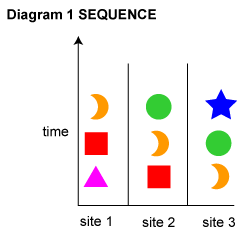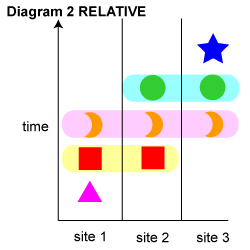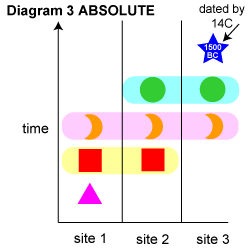Relative and Absolute Dating
Humans experience life through time. We have a good sense of the order in which things happened to us (when we were children, students, adults), that is, a relative sequence of events. We can also handle parallel relative sequences (e.g. which friends we knew at which stage of our lives). But unless we have been revising a CV or resumé recently we may be less clear about the precise years in which particular things happened (that is, absolute chronology). But there will always be some external events to provide anchors to the relative chronology (where we were when Kennedy was assassinated, or on 11 September 2001, for example).
Archaeology also depends on both relative and absolute dating. In this session we will introduce you to the idea of relative and absolute dating, and explore the difference between these two ideas.
 Diagram showing sequence dating © TALL |
Diagram 1 shows three sites, each with its own sequence of assemblages. Here the assemblages are represented by different symbols (star, square etc.), arranged in chronological order with the oldest at the bottom.
 Diagram showing relative dating © TALL |
Relative dating, shown in Diagram 2, is like playing the slot machines: you want at least two identical things to line up at the same time.
Kerr-ching! Here, the process of lining up contemporary assemblages reveals that the three sites have some chronological overlaps. Site 1 is the earliest, Site 2 is in the middle and Site 3 is the latest. So far, so good – but we still don’t have a way of pinning our relative sequence down in time.
 Diagram showing absolute dating © TALL |
Diagram 3 shows that organic material from the latest assemblage at site 3 has been dated by 14C (radiocarbon) to 1500 BC which is an absolute date. Now the sequences at all three sites can be compared with assemblages of a similar date in other regions, all over the world.